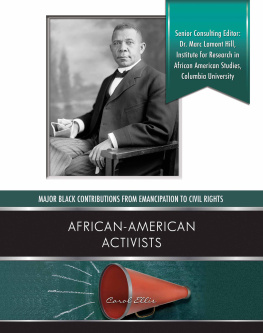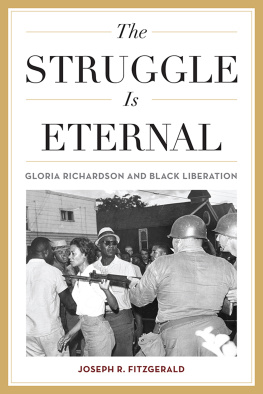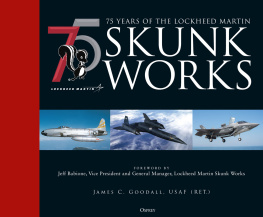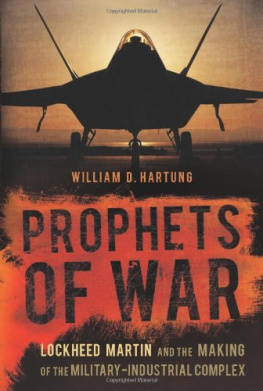Lockheed, Atlanta,
and the Struggle for
Racial Integration
Lockheed, Atlanta,
and the Struggle for
Racial Integration
RANDALL L. PATTON

2019 by the University of Georgia Press
Athens, Georgia 30602
www.ugapress.org
All rights reserved
Designed by Kaelin Chappell Broaddus
Set in 10.25/13.5 Minion Pro by
Classic City Composition, LLC
Most University of Georgia Press titles are available from popular e-book vendors.
Printed digitally
Library of Congress Cataloging-in-Publication Data
Names: Patton, Randall L., 1958- author.
Title: Lockheed, Atlanta, and the struggle for racial integration / Randall L. Patton.
Description: Athens, Georgia : The University of Georgia Press, [2019] | Includes bibliographical references and index.
Identifiers: LCCN 2019010726 | ISBN 9780820355146 (hardcover : alk. paper) | ISBN 9780820355153 (ebook)
Subjects: LCSH: Affirmative action programsGeorgiaHistory20th century. | Lockheed-Georgia CompanyHistory. | Lockheed Aeronautical Systems Company. Georgia DivisionHistory. | Public-private sector cooperationUnited States History20th century. | Civil rights movementsUnited StatesHistory20th century.
Classification: LCC HF5549.5.A34 P37 2019 | DDC 331.13/30975823109045dc23 LC record available at https://lccn.loc.gov/2019010726
For Hugh Gordon and Harry Hudson...
CONTENTS
CHAPTER 1 Economic Necessity and Governmental Pressures
Lockheed and Equal Employment Opportunity before Georgia
CHAPTER 2 Lockheed Will Live in the Southern Tradition
Lockheed Comes to Georgia, 19511954
CHAPTER 3 Progress to Be Permanent Had to Be Gradual
Gradualism and Its Discontents, 19541960
CHAPTER 4 A Problem That Was Already Here
The Early Plans for Progress Era, 19611964
CHAPTER 5 Build the People
The Era of Uncertainty, 19651970
CHAPTER 6 The Competitive Economic Advantages of Having an Excellent Minority Hiring Record
The Banks Case and Its Aftermath, 19661972
CHAPTER 7 Atlanta Will Be a Problem
Lockheed-Georgia and the MEA, the NAB, the CETA, and the Equal Employment Conundrum, 19731982
ACKNOWLEDGMENTS
I thank a number of people for their help in bringing this project to fruition. Several colleagues at Kennesaw State University were patient enough to serve as informal sounding boards for ideas. In particular, LeeAnn Lands, David Parker, Susan Rouse, and Brian Wills helped me talk through options and vent frustrations.
In 2011, I helped organize a conference at my university on Integrating the Workplace. That conference helped me understand the broader significance of Lockheed-Georgia and allowed an opportunity to discuss employment desegregation with some of the leading authorities. I deeply appreciated sharing ideas with participants, attendees, and co-organizers of that conference, especially Joseph Abel, Terry Anderson, Jennifer Delton, Flora Devine, Frank Dobbin, Rebecca Hill, Robert A. Pratt, David Roediger, Robert S. Smith, Johannes Steffens, Steve Usselman, Seneca Vaught, and Gavin Wright. Lockheed Martins Brian Johnstone was instrumental in helping us organize that conference.
The director and staff of the Kennesaw State University Archives provided aid in the research for the manuscript. Archives director Tamara Livingston and former digital archivist Anne Graham went above and beyond the call of duty in dealing with the acquisition and organization of a complex manuscript collection. Anne and current digital archivist Alissa Helms digitized resources that greatly facilitated this work, including the Hudson manuscript, many interviews associated with the Gordon collection, and a number of photographs and documents. And Joyellen Freeman, curator of special collections, was always helpful. Thank you to all the archives staff.
Lockheed Martin and corporate historian Jeff Rhodes graciously granted permission to use some images from the Lockheed Southern Star. That permission implies no endorsement of any of the authors interpretations or assertions. This project is an independent scholarly study and received no financial support from Lockheed Martin.
My emeritus colleague Thomas A. Scott provided important background and context with his own research on the history of Lockheed-Georgias home, Cobb County. In addition to his work, Tom has been a good friend and a thoughtful adviser.
Mick Gusinde-Duffy at that University of Georgia Press expressed early confidence in the project. His advice and counsel have been crucial. Bethany Snead, who guided the book through the publication process, has been kind, helpful, and wiseas usual. She deserves a medal for putting up with this technochallenged author through yet another manuscript. Jon Davies of the University of Georgia Press also was very helpful. Copy editor Ellen Goldlust improved the manuscript immensely; her help is greatly appreciated.
The comments provided by the manuscripts anonymous readers at both the proposal and draft stages improved the manuscript significantly. I thank them for their patience, close reading, and constructive critiques, and I have attempted to implement most of their suggestions. Any errors or shortcomings, however, are solely my responsibility.
To Hugh Gordon and Harry Hudson, I extend special posthumous thanks. Gordon became convinced that there was a story to tell about him and Lockheed. Though we often differed over precisely how to tell that story, he and I came to share a commitment to the project. Hudson wrote a rare, thoughtful memoir of his working life that served as a critical resource for this study. Harrys son, Harry Hudson Jr., graciously donated a copy of his fathers memoir to the KSU Archives. I often tell the story of how he went looking for his fathers manuscript in the attic after the subject had come up in a phone interview we were conducting. Without Hugh, Harry, and Harry Jr., this project would not have been possible or even conceivable.
My familywife, Karen; sons, Randall and Matthew; daughter-in-law, Lisy; and nieces and nephews and grandnieces and grandnephews helped keep me centered.
A NOTE ON THE COMPANY NAME
From January 6, 1951, to July 19, 1961, the subsidiary/division based at Air Force Plant 6 was Lockheed Aircraft-Georgia Division. From July 20, 1961, to September 2, 1987, the official name was Lockheed-Georgia Company. The Marietta subsidiary/division was informally known as Lockheed-Georgia throughout the 195187 period, and that designation has been used throughout the book. Since January 27, 2000, the Georgia location has been part of Lockheed Martin Aeronautics Company.
Lockheed Martin Aeronautics Company granted permission to use some photographs from the Lockheed-Georgia newsletter, the Lockheed Southern Star. The company neither sponsored nor reviewed this manuscript, and this permission implies no endorsement of the interpretations contained herein.
Lockheed, Atlanta,
and the Struggle for
Racial Integration
INTRODUCTION
Hugh Gordon, a white former personnel executive, sat down for an interview with Reginald Kemp, a black former aircraft manufacturing experimental technician. Each was a retiree from Lockheed Aircrafts Georgia division, headquartered in Marietta. Gordon was researching the integration of the workplace at Lockheed and in the South, a struggle in which both he and Kemp had been foot soldiers. Gordon was surprised to learn that he and Kemp shared the same hire-in date at LockheedMay 14, 1951. At that time, employment was less than 3,000 and only a small area of the massive B-1 factory building was lighted and in use for an aircraft assembly line, he recalled. He and Kemp seemed to have a difference of opinion as to the location of the Employment Office. The two men got into a conversation about head houses. Access to the main Lockheed-Georgia facility, Air Force Plant 6, then as now, was via tunnels. The structure at the entrance to each tunnel was referred to as a head house.
Next page







